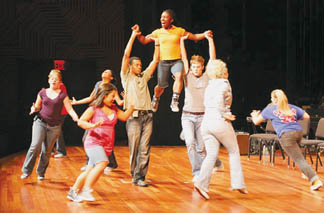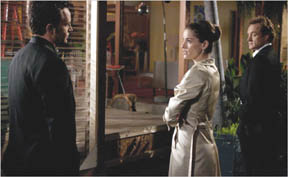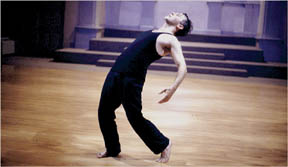|
observer |
|
|
|
|
|
OTHER LINKS |

|

|

|
EntertainmentDramatically stark orientationMany colleges around the country feel obliged to caution entering students about what to expect and what to avoid, but few offer more hard-hitting warnings than New York University's theatrical orientation created by the New York playwright and director Elizabeth Swados.
The musical "The Reality Show: NYU," which has already played to nearly 5,000 incoming students at the university and will be shown twice more this month, tells of drugs and date rape, drinking and anorexia, depression and suicide. It is not a pretty picture, but it is not far from the reality of a large urban university. And N.Y.U. feels more pressure than most because of the spate of student suicides during the 2003-4 school year. "This production came out of that terrible year," said Marc Wais, N.Y.U.'s vice president for student affairs. "There was a sense of urgency." In the fall of 2004 the university used an outside theater group to tell new students about a telephone hot line and counseling and referral program it created after the suicides. But N.Y.U. officials decided that a production by students, for students, might be even more effective, and turned to their Tisch School of the Arts. Arthur Bartow, chairman of the undergraduate drama program at the time, recommended Ms. Swados, 55, who first gained fame with her 1978 Broadway musical "Runaways," and had just become a full-time teacher at the school. "I knew Liz had a way of working with students to get them to tell the truth rather than some adult's version," he said in a recent interview. "They produce something that is much more stark, much more real, much more shocking than adults would allow themselves to write." Suicide and depression are topics Ms. Swados knows well. Her mother and brother took their own lives, and, as she explained in "My Depression: A Picture Book," published last year by Hyperion, she contemplated doing the same. The students, chosen from Tisch after several rounds of auditions by Ms. Swados, provided their own darkness. Vella Lovell, a senior, said that while at times the students did portray themselves, other times they were portraying "someone far removed from them." "To do this piece we all had to be willing to play the most outrageous characters because to at least one person in the audience it's not so outrageous," she said. "If we were playing ourselves, we tried to make it as big as possible - all extremes." Ms. Swados, who has no children, says she is "not maternal," but thinks of herself as a kind of gang leader. "The kind of kids who would take on this kind of project tend to be disciplined," she said. But she also tells them that "anyone with an attitude toward me or toward each other will be fired." She added, "Everything else, they can do anything." One scene that drew gasps was performed by a dark-skinned woman, who
announced in a na And always there is the commercial: Whatever the problem, help is there. Again and again the cast sang the hot line phone number that students could call for help. By the third or fourth time the number was a joke but one students would remember. So far the musical has played to hoots and hollers. "I was at the edge of my seat, wondering what topic they were about to cover next," said Katherine Cheng, a first-year student from New York City, who called the show "extremely hysterical yet thought-provoking." Arnold Ng, another New York freshman, said he loved the singing, dancing and comedy. (NY Times)'Fiction over fact' in 9/11 showThe first part of a controversial series on the 11 September attacks was misrepresentative despite being re-edited, the Clinton Foundation says. US network ABC "chose fiction over fact and entertainment over education" by misquoting Clinton administration officials in The Path to 9/11, it said. The former president's aides were angry at suggestions he failed to deal with an Islamic militant threat before 2001. ABC altered the drama, lasting two and a half hours, before transmission. It declined to say whether any of the last-minute changes were made to address the complaints. But parts of the production which drew the most fire from leading Democrats were toned down. The Clinton Foundation - a charitable organisation set up by Mr Clinton - said ABC had received warnings "from members of the 9/11 Commission, 9/11 family members and public officials from across the political spectrum" about supposed inaccuracies. "Their claims of edits notwithstanding, The Path to 9/11 had Clinton administration officials saying things they did not say and doing things they did not do," claimed spokesman Jay Carson in a statement. "Many of these scenes are directly contradicted by the 9/11 Commission Report. The American public deserved better." The foundation released a four-page document outlining three elements of the programme which it claimed were misrepresentative of real-life events. This scene, which indicated that the decision was a key factor in Bin Laden getting away, was left intact by editor. The programme, broadcast in the US on Sunday evening, featured a disclaimer. This was aired three times and emphasised that it was not a documentary. "If people blame Bill Clinton after seeing this, then the mini-series has failed," said Mr. Kean, the former Republican New Jersey Governor. (BBC NEWS)'West Wing' to West Coast
The implication is unmistakable: This is an enormously successful television writer. Aaron Sorkin, beyond writing the play and movie "A Few Good Men" and the well-regarded ABC series "Sports Night," was the creator - auteur really - of "The West Wing," one of the most celebrated drama series in television history. Television writers are not usually so esteemed that their next project is awaited with fevered anticipation. This seems to be the case, however, with Mr. Sorkin. His new series, "Studio 60 on the Sunset Strip," scheduled to have its premiere next Monday night at 10 on NBC, gives every indication - in research by NBC, in the hunger of fans to get bootleg copies of the pilot tape or script on the Internet - of being the show viewers avidly want to see in the new television season. This promise is not the result of people's fascination with the premise for "Studio 60": the backstage machinations of a troubled sketch-comedy show on a fictional network. It could be because viewers want to see Matthew Perry in his first show after "Friends" or Amanda Peet in her first television role. But nobody really thinks those are big factors. The main reason viewers seem eager to see the new drama is that Aaron Sorkin wrote it. What many people apparently expect, based on the show's pilot, is something of a personal manifesto from Mr. Sorkin, abetted by his long-time directing and producing partner, Thomas Schlamme, who, with Mr. Sorkin, left "The West Wing" in 2003. What does Mr. Sorkin say about the speculation that his experiences are being reproduced in the series? "There's a character in the show who's had a cocaine relapse," Mr. Sorkin said, not even bothering to cite his own similar experience. "There are two characters who were fired from their last sketch-comedy show in the wake of 9/11 because of the feeling that they were too liberal - that has echoes of 'The West Wing.' And you know, people are saying the character played by Amanda is supposed to be Jamie Tarses." (Ms. Tarses is a former NBC and ABC program executive.) Then there is the character of Harriet, a former lover of Mr. Perry's character, who is devoted to her Christian faith. Mr. Sorkin said people are presuming the character is based on the Broadway star Kristin Chenoweth, whom Mr. Sorkin once dated. His reaction to the speculation: "All of that is true." He laughs quickly before adding qualifiers. "There's no question that this is the most personally I have ever written, simply because I don't live in the world of the White House or a sports TV show or a Navy courtroom. And there are real people who were jumping-off points for the characters. (NY Times)The 'Queen' scoops top award in VeniceDame Helen Mirren was last week thrilled to be named best actress at the Venice film festival for her performance in The Queen. In the Stephen Frears film, she plays the monarch coming to terms with the death of Princess Diana. Dressed in an elegant blue evening gown and Bulgari diamonds, she was introduced on stage as 'Her Majesty Helen Mirren'. The 61-year-old looked elated by her win, not least because her triumph is certain to boost the film's chances of Oscar glory. She gave the audience a joke curtsey as she accepted her award. 'It's always terrifying to send your movie out for its first little toddling steps,' she said. 'It's an incredible honour to have this film take its first steps here at the Venice Film Festival.' The actress insisted her performance was just a small component of the film. (The Observer.UK)Bush assassination film defendedThe director of a movie portraying the fictional assassination of US President George Bush has defended his film after critics called it "irresponsible". Gabriel Range said people had rushed to judge the film as it received its premiere at the Toronto Film Festival. "It is using the lens of the future to look at the present," Range said. "It is about issues that have affected us all in the last five years." Mr. Bush's Republican party has branded the film "shocking" and "disturbing". John Beyer of UK TV pressure group Media Watch said the film "may well put ideas into people's heads". But Range said he did not believe the film glorified the president's death. "I think the film makes it clear it would really be a horrific event," he told the Associated Press news agency. "I really don't think that anyone would get the idea of assassinating Bush from this film." Presented as a mock documentary, Death of a President shows Mr. Bush being targeted by a sniper during an anti-war rally in Chicago in 2007. He is confronted by a demonstration when he arrives in the city to deliver a speech to business leaders and is shot as he leaves the venue. The ensuing investigation focuses on a Syrian-born man and recalls the controversy over President Kennedy's assassination in 1963, as debate rages over whether the sniper was a lone gunman or part of a bigger conspiracy. "It is a film about America today," Range told the audience after the premiere. The film's producers said they had chosen to put President Bush in the movie to make it more realistic. "The central conceit of the film was that it is a drama, but told in the style of what we hope is a fairly authentic, classic, retrospective documentary," said producer Simon Finch, who co-wrote the screenplay with Range. "Clearly, if we had told a retrospective documentary with a fictional president, it would have undermined and undercut that central idea." Death of a President was made by UK broadcaster channel 4, and will be shown on the digital channel more 4 on 9 October. It was being screened in Toronto in the hope of finding a US distributor. BBC NEWSDance Review :Don't call me a dancer
His interests clearly ranged more widely than dance alone, given that the program included a slyly fanciful short film by Alexandra Brodsky and text that Mr. McCall spoke, live or on tape, which he culled from writing by J. D. Salinger and E. B. White and from news articles. The "news" here had almost nothing to do with daily events or history. Mr. McCall, who has also taught and directed Off Broadway and regional productions, seemed simply to be drawing the audience into an evening spent in his company and with his musings, with nothing much to prove. He might have been a living room dancer in "Past or Present," the suite of dances and excerpts that opened the program, set to music as various as teasing rock songs and bits of Faur,'s Requiem and Satie's "Gnossiennes." The pieces looked like movement exercises at times, created on the spot while playing with a particular piece of music, gesture or persistent notion in a cleared-away space. They became less sketchy but remained eloquent. Mr. McCall may not have chosen to call himself a dancer, but it was clear that for him dance could be thought made visible and palpable. Ms. Brodsky's film, "Miss Alyssa," could be a fast trip through a man's mental state after a night of heavy partying. Little animated figures darted through a wittily edited montage of snapshots of Mr. McCall and friends, nutty juxtapositions of tribal and party dancing, and clips from Hollywood films. "The Winedark Sea" and "Original Face" were other kinds of voyages, through the world beyond and through his own mind, as he contemplated reality and who his "I" might be, unassumingly and with the compelling clarity of an adult who has lived long enough to justify such ventures. Several images in "Original Face" hauntingly suggested Icarus in a long, slow float to another place. |


 Brendan
McCall described himself as a movement artist in program notes for
"Dances, Stories and the Winedark Sea," an evening of solos that he
performed on Saturday night at the Danspace Project at St. Mark's
Church.
Brendan
McCall described himself as a movement artist in program notes for
"Dances, Stories and the Winedark Sea," an evening of solos that he
performed on Saturday night at the Danspace Project at St. Mark's
Church. 







